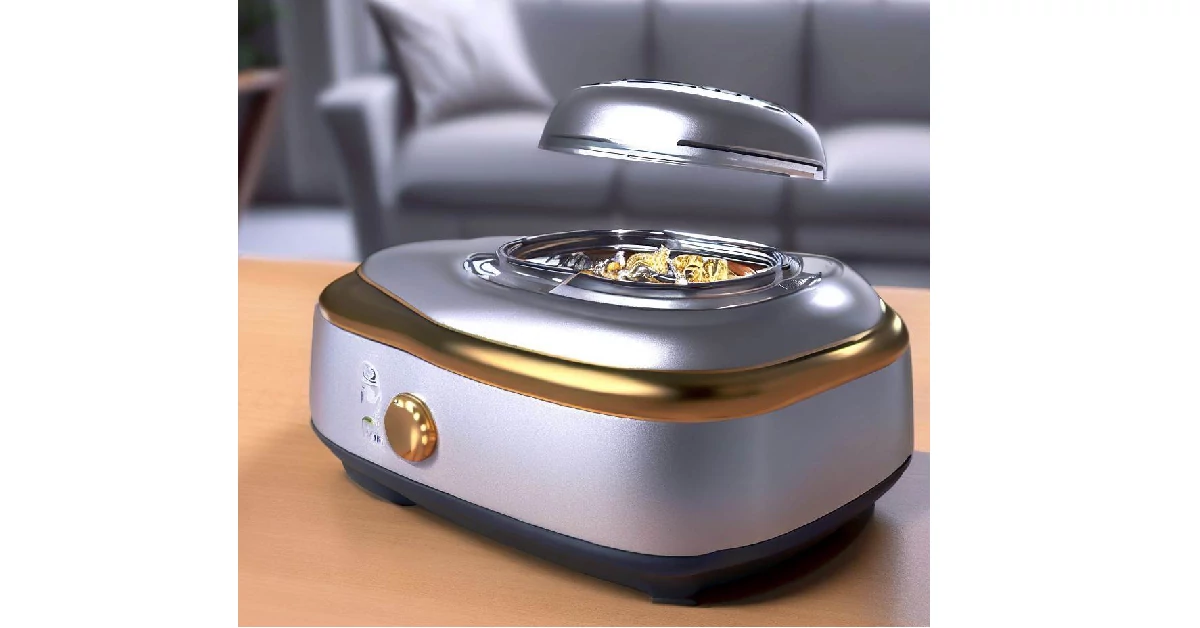Are you tired of wearing dull, tarnished earrings that no longer sparkle like they used to?
Do you find yourself constantly replacing your favorite pairs because they’ve lost their shine?
If so, it’s time to take matters into your own hands and learn the art of earring cleaning. Not only will this save you money in the long run, but it will also ensure that your earrings remain in pristine condition for years to come. In this article, I’ll explore the importance of cleaning earrings, the materials used for earrings, safe and effective cleaning methods, signs your earrings need cleaning, and how to avoid harmful cleaning products. So, grab your favorite pair of earrings and let’s get started!
Key Takeaways
- It is important to clean your earrings regularly to maintain personal hygiene and prevent infections, dirt buildup, and damage.
- Different materials require specific cleaning instructions for earrings.
- Regular cleaning is essential for preventing infections and keeping earrings looking their best.
Importance of Cleaning Earrings

Keeping your jewelry clean is essential for both personal hygiene and the longevity of your earrings. Earrings are in close contact with your skin, and the accumulation of dirt, grime, and oils can create a breeding ground for bacteria, germs, and infections.
Here are some reasons why it is important to clean your earrings regularly:
Prevent Infections
- Earrings can cause painful and dangerous infections if they are not cleaned regularly. The accumulation of dirt and oils on the earrings can create a breeding ground for bacteria and germs that can cause infections.
- Cleaning your earrings regularly can prevent infections and keep your ears healthy.
Prevent Dirt Buildup
- Earrings are constantly exposed to natural oils, hair creams, makeup items, sweat, air particles, and improperly rinsed-off shampoos and soaps, which can cause dirt buildup.
- Cleaning your earrings regularly can help prevent this dirt buildup and keep your earrings looking clean and shiny.
Prevent Damage
- Dirt, grime, and oils can accumulate on the metal and stones of your earrings, causing friction and pressure that can cause gems to loosen or fall out of their settings.
- Cleaning your earrings regularly can help remove these harmful elements and ensure that your gems are secure in their settings.
Personal Hygiene
- Earrings are exposed to more dirt and grime than just about any other piece of jewelry, excluding rings. Unlike fingers (and rings) which will get cleaned often, the nature and location of earrings will mean that the earring dirt will stay inside for much longer.
- Cleaning your earrings regularly is important for personal hygiene.
Cleaning Schedule
- The frequency with which you should clean your earrings depends on how often you wear them. As a general rule of thumb, it’s good to maintain a cleaning schedule of about once a week to avoid dirt and bacteria buildup and prevent infection, bad odor, and debris that accumulates on earrings.
- However, fresh wounds are more likely to develop infections, so it is recommended that you clean your freshly pierced ears and earrings at least twice per day.
Cleaning Methods
- If your earrings are made of gold, you can soak them in dish soap and water for about 30 minutes, gently brush them with a soft toothbrush, rinse thoroughly, and gently dry with a lint-free cloth.
- If your earrings are made of pearls, it’s best to avoid ultrasonic cleaners or chemicals that are routinely used to clean gold, silver, and other metals.
- If your jewelry contains high sensitive surfaces or materials, go for an ultrasonic cleaning machine with a higher frequency between 80 kilohertz and 130 kilohertz.
Materials Used for Earrings
Earrings are a popular accessory that can be made from a variety of materials. From polymer clay to precious metals, the possibilities are endless. When it comes to cleaning earrings, it is important to follow the specific cleaning instructions for the material used to avoid damaging the jewelry.
Common Materials Used for Earrings
There are many materials that can be used to make earrings. Here are some of the most common:
- Polymer clay: This is a popular material for handmade earrings. It is lightweight and comes in a variety of colors and designs.
- Metals: Sterling silver, gold-filled, and other metals are often used to make earrings. These materials are durable and can be polished to a high shine.
- Beads: Beads are a versatile material that can be used to create unique and colorful earrings. Swarovski crystals, glass beads, Japanese Miyuki seed beads, turquoise, coral, and gemstone beads are all popular choices.
- Stainless steel, gold, silver, polyester, and leather: These materials are often used to create statement earrings that are bold and eye-catching.
- Copper: This material is a great choice for those who prefer a rustic or bohemian look.
- Finer chain: Delicate chains can be used to create elegant and understated earrings.
Cleaning Earrings
When it comes to cleaning earrings, it is important to follow the specific cleaning instructions for the material used. Here are some tips for cleaning earrings made from different materials:
- Gemstones: Warm water, a mild detergent, and a soft brush are the safest cleaning materials for almost all gems. For pearls, use a soft polishing cloth and gently rub away any dirt or oils. For more substantial dirt and grime, use warm water and a mild dishwashing liquid to gently scrub. Be mindful of cleaning natural or common gemstones like sapphires, amethyst, rubies, and topaz, and handle them with particular care. Use a soft brush and a mild detergent to gently scrub the jewelry.
- Delicate jewelry: Gold and gemstones can be soaked in a bowl of warm water and mild dishwashing soap. About 15 to 20 minutes of soaking is enough to loosen dirt and grime. Use a soft brush to gently scrub the jewelry.
- Avoid harsh chemicals: Avoid using cleaning solutions that contain ammonia or chemicals that can damage sensitive gems like pearl or amber.
Safe and Effective Cleaning Methods
When it comes to cleaning jewelry, it’s important to remember that not all types of earrings can be cleaned the same way. Each type of earring requires a different cleaning method to ensure that it remains in top condition.
Here are some tips for cleaning different types of earrings:
Silver Earrings
Silver earrings can be cleaned with soap and water. Simply place the earrings in a bowl of warm water with unscented washing up liquid or soap. Mix them and move the earrings in the water, leave for up to 30 minutes.
Rinse the earrings and pat dry with a clean cloth.
Gold Earrings
Gold earrings can be soaked in dish soap and water for about 30 minutes and then gently brushed with a soft toothbrush. If you need more than water to clean your gold jewelry, create a solution with gentle dish soap and water.
Soak the earrings in the solution for a few minutes, then rinse and dry with a soft cloth.
Pearl Earrings
Pearl earrings are delicate and require special care. It’s best to avoid ultrasonic cleaners or chemicals that are routinely used to clean gold, silver, and other metals. Instead, you can clean them with a mild dish soap and water solution or hydrogen peroxide.
Soak earrings in hydrogen peroxide for a few minutes to disinfect and wash away grime.
Rinse and dry with a soft cloth.
Safe and Effective Methods to Clean Earrings
1. Warm water and soap: Mix unscented washing up liquid or soap with warm water to create a solution. Place earrings in a bowl of warm water and mix them. Move the earrings in the water and leave for up to 30 minutes. Rinse the earrings and pat dry with a clean cloth.
2. Mild dish soap and warm water: Mix mild dish soap with warm water to make an inexpensive and effective jewelry cleaner at home. Soak the earrings in the solution for a few minutes, then rinse and dry with a soft cloth.
3. Hydrogen peroxide: Soak earrings in hydrogen peroxide for a few minutes to disinfect and wash away grime. Rinse and dry with a soft cloth.
4. Toothpick: Use a toothpick to remove dirt from earrings with intricate designs.
5. Polishing cloth: Use a polishing cloth to clean gold jewelry. If you need more than water to clean your gold jewelry, create a solution with gentle dish soap and water. Soak the earrings in the solution for a few minutes, then rinse and dry with a soft cloth.
Cleaning Schedule for Earrings
It’s important to note that the frequency with which you clean your earrings depends on how often you wear them. As a general rule of thumb, it’s good to maintain a cleaning schedule of about once a week for earrings that get dirtier more often, like those worn daily.
By following these simple cleaning methods, you can keep your earrings looking their best for years to come.
Signs Your Earrings Need Cleaning
Earrings are a staple accessory for many people, but they require regular cleaning to maintain their shine and prevent infections. Here are some signs that your earrings need cleaning:
- Debris, crusting, dirt, and makeup around the piercing site: If you notice any buildup around your piercing site, it’s time to clean your earrings.
- Tenderness, pain, itching, and dried blood around the piercing site: These symptoms could indicate an infection, so it’s important to clean your earrings and seek medical attention if they persist.
- The holes in your ears smell like rotten cheese: This smell is caused by bacteria buildup, which can be prevented by cleaning your earrings regularly.
- The earrings are discolored or have lost their shine: This could be a sign of tarnishing, which can be prevented by following the tips below.
- The earring backs are too tight against the earlobe, causing pressure that reduces blood flow to the earlobe: This can cause discomfort and even damage to the earlobe, so it’s important to clean your earrings and adjust the backs if necessary.
- The posts have nickel in them, causing an itchy, allergic reaction: If you have a nickel allergy, it’s important to choose earrings without nickel and clean them regularly to prevent irritation.
- The earrings are not cleaned regularly, leading to grimy, infected holes when the dirty earrings introduce bacteria into your piercing: Regular cleaning is essential to prevent infections and keep your earrings looking their best.
To prevent earrings from tarnishing or becoming discolored, here are some tips:
- Keep it dry: Moisture and liquids can cause jewelry to tarnish quickly. Avoid wearing earrings while swimming, showering, or washing your hands.
- Store it properly: Store your earrings in a plastic bag or airtight container to prevent exposure to oxygen and sulfur particles in the air.
- Separate your jewelry by metal and type: Different metals and types of jewelry require different care. Separating them can help prevent tarnishing.
- Use anti-tarnish strips: Anti-tarnish strips can absorb the culprits in the surrounding air that cause jewelry to tarnish over time. Place them in your jewelry drawer, jewelry box, or storage.
- Clean it regularly: Wipe your earrings with a soft cloth after wearing them to remove any oils or dirt that may cause tarnishing. Avoid using harsh chemicals or silver dips, which can damage the jewelry.
- Use soap and water for a gentle clean: First, test it on a small spot on your jewelry to make sure it’s safe. Dry your jewelry really well after doing this so there’s no water left over on the metal. That would cause it to tarnish even more!
- Protect it during hand washing: It may be wise to protect your earrings during this time where hand washing is increased by storing them away temporarily.
By following these tips and regularly cleaning your earrings, you can keep them looking their best and avoid infections and irritation.
Shine Bright Like a Pearl: The Importance of Pearl Cleaning in Your Jewelry Routine
When it comes to jewelry cleaning, pearls often get overlooked. Maybe it’s because they’re not as flashy as diamonds or as trendy as statement earrings, but pearls are a classic and timeless addition to any jewelry collection.
However, they require special care and attention to maintain their luster and beauty.
Pearls are delicate and porous, which means they can easily absorb dirt, oils, and other substances that can dull their shine.
That’s why it’s crucial to clean them regularly with a gentle solution and a soft cloth.
Avoid using harsh chemicals or abrasive materials that can damage the surface of the pearls.
By incorporating pearl cleaning into your jewelry routine, you can ensure that your pearls will continue to shine bright for years to come.
Plus, taking care of your jewelry shows that you value and appreciate the pieces you own.
So, don’t forget about your pearls – give them the TLC they deserve!
For more information:
Essential Pearl Cleaning Guide

Avoiding Harmful Cleaning Products
Avoid Harsh Chemicals and Abrasive Materials
When it comes to cleaning earrings, it’s important to avoid using harsh chemicals or abrasive materials that can damage the jewelry. Some cleaning solutions that should be avoided include:
- Harsh chemicals: Avoid using bleach, ammonia, or acetone, as they can damage the metal or gemstones in the earrings.
- Abrasive materials: Avoid using toothpaste, baking soda, or salt, as they can scratch the surface of the earrings.
- Hot water: Avoid using hot water, as it can damage certain types of gemstones or cause the metal to expand and contract, leading to damage or warping.
Use Mild Dishwashing Liquid and Warm Water
Instead of using harsh chemicals or abrasive materials, use mild dishwashing liquid and warm water to clean your earrings. Soak the earrings for 10 to 20 minutes to soften residue and dirt, then gently brush with a soft-bristled brush.
Rinse with clean water and pat dry with a clean cloth.
Create Your Own Cleaning Solution
Alternatively, you can create your own cleaning solution using hydrogen peroxide or rubbing alcohol. Be sure to use a soft toothbrush and rinse the earrings thoroughly with warm water afterwards.
Maintaining the Quality and Appearance of Your Earrings
Cleaning your earrings is important to restore shine and remove any oils or dirt build-up. Here are some additional tips for maintaining the quality and appearance of your earrings:
Choose the Right Style for Your Face
It’s a good idea to choose a style of earrings to accentuate the shape of your face. For example, if you have a round, full face, you may wish to choose lovely drop earrings. Drop earrings make the face appear longer and slimmer.
Avoid large, round hoop earrings that draw the eyes across the face making it appear rounder.
Store Your Earrings Properly
Store your earrings in a dry, cool place, away from direct sunlight. You can use a jewelry box or a soft pouch to keep them safe and prevent them from getting tangled or scratched.
Avoid Wearing Your Earrings in the Gym or Spa
Moisture, as well as the pool chlorine, can discolor your earrings. It’s best to remove your earrings before swimming, sweating, or steaming.
Get Your Earrings Professionally Cleaned
If you have valuable or delicate earrings, it’s best to get them professionally cleaned by a jeweler with professional training and a good reputation.
Closing remarks and recommendations

So, there you have it – everything you need to know about cleaning your earrings. But before you go, let me leave you with a thought.
We often think of cleaning our jewelry as a mundane task, something we do out of necessity to keep our accessories looking shiny and new.
But what if we shifted our perspective? What if we saw the act of cleaning our earrings as a form of self-care, a way to honor the pieces that adorn our bodies and the memories they hold?
Think about it – each pair of earrings has a story.
Maybe they were a gift from a loved one, or a souvenir from a special trip.
Maybe they were the finishing touch to an outfit that made you feel confident and beautiful.
By taking the time to clean and care for our earrings, we are not only preserving their physical appearance, but also the memories and emotions they represent.
So, the next time you sit down to clean your earrings, take a moment to reflect on the stories they hold.
Embrace the act of caring for them as a way to honor yourself and the experiences that have shaped you.
Who knew that something as simple as cleaning your jewelry could be so profound?
Looking for a new Ultrasonic jewelry cleaner?
Choosing a gadget can be very difficult if you know nothing about the technology.
Some will pay for features they do not need while others may not consider what they really want.
So I created this quick, newbie guide to help you focus on what is really important to you:
The Best Ultrasonic Jewelry Cleaners (For You!)
Best Practices For Using Ultrasonic Cleaners For Jewelry
Tip: Turn on the caption button if you need it. Choose ‘automatic translation’ in the settings button if you are not familiar with the english language. You may need to click on the language of the video first before your favorite language becomes available for translation.
Links and references
- 1. GemOro Superior Instruments: The Brilliant Spa Quick Reference Guide
- 2. UltraSpa™ Ultimate Professional Quality Manual
- 3. Jewelry Cleaner and Sanitizer SJC-1601 Manual
- 4. MGUC500 Manual
- 5. GemOro “Sparkle Spa” PERSONAL ULTRASONIC CLEANER Manual
- jewelrysupply.com
- instyle.com
- rogersandhollands.com
- southernliving.com
- byrdie.com
- gemsociety.org
- gia.edu
Related articles:
Earring Maintenance 101: Tips for Safe & Effective Cleaning
Earring Care: Cleaning Solutions & Tips
Tarnish Removal for Earrings: Tips and Tricks
Sparkling Earrings: Tips for Polishing
Sparkle with Jewelry Cleaning Tools
Discover Safe Earring Storage Solutions
Natural Methods for Clean Earrings
Earring Hygiene: Clean & Safe Jewelry
Essential Earring Disinfection Tips
How do ultrasonic jewelry cleaners work?
Personal reminder: (Article status: rough)

